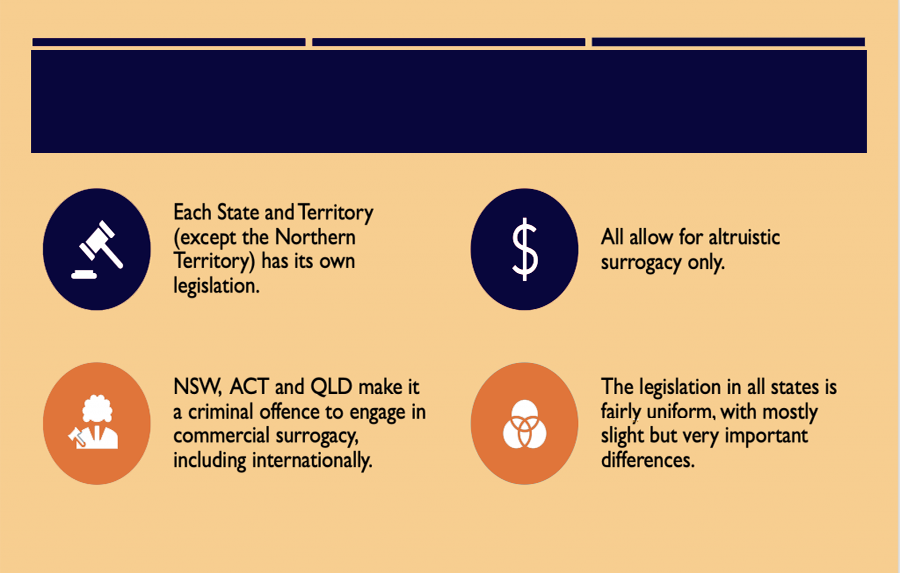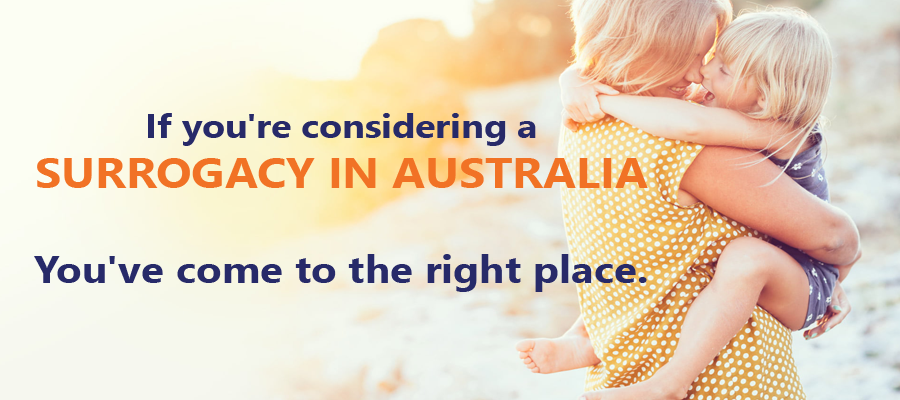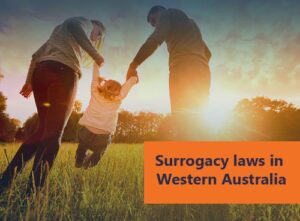Table of Content
Surrogacy laws in Australia vary on a state to state basis. So, one really has to pay attention to the regulations and legislation of the state in the same regard. Still, in general, only altruistic surrogacy is permitted in most of the Australian states where the intended parents cannot pay the surrogate mother in Australia more than her incurred medical expenses.
Is surrogacy legal in Australia?
As mentioned above, surrogacy is a state subject in Australia. For instance, Western Australian surrogacy law states that before a voluntary surrogacy agreement can be signed with a gestational carrier, a legally binding “Surrogacy Arrangement” must be signed by both parties.
Moreover, the following requirements must be met, among others, for these agreements to be valid:
- The agreement must be in writing and bear the signatures of all parties.
- The surrogate mother must have given birth before to a healthy child and be at least 25 years old.
- The parties must demonstrate that they sought legal advice from an attorney at least three months prior to the contract’s signing
- Before signing a surrogacy agreement or requesting a Parentage Order, the parties should consult with an experienced attorney with knowledge of Australia surrogacy law.
- To avoid a conflict of interest, a lawyer cannot provide counsel to both the couple seeking surrogacy arrangements and the surrogate mother in Australia at the same time.
- A medical evaluation of the parties is necessary to determine whether they are capable and suitable to be parents to a child born to a surrogate.
- It should be noted that the state of Western Australia expressly prohibits using age as a defense for denying someone the opportunity to assist in caring for a surrogate child.
- The Reproductive Technology Council must also approve the settlement reached between the parties. If this agreement is not in place before the birth mother becomes pregnant, the court will declare it void as per the surrogacy laws in Australia.
- If the services of a surrogacy clinic in Australia are used, it’s likely that the parties will want additional conditions to be satisfied.
Understanding Parentage Orders in Australia
If the parties have followed the above-described procedures to enter into a legally binding Surrogacy Arrangement, the intended parents may petition the court for a Parentage Order. Moreover, the surrogacy law in Australia varies depending on the state, but in Western Australia, for example, a Family Court application must be made no later than 28 days and no later than 6 months after the child is born.
On the other hand, when deciding on a Parentage Order, the Court will consider what is currently in the child’s best interests. The evidence supports the notion that the child prefers to live with the intended parents. According to the Parentage Order, the same parents will be regarded as the child’s legal parents for the rest of the child’s life.
In what situations intended parents seek parental orders in Australia?
The intended parents’ only recourse is to ask the Family Court of Western Australia for a Parenting Order if the birth mother refuses to give the child to them after birth. This is incredibly difficult and fraught with danger, especially when the birth mother has formed a strong emotional bond with the child and is able to parent her on her own on an emotional and financial level.
It is likely that the family who organized the surrogacy may be able to obtain orders with regard to the child living with them, parental responsibility for long-term parenting decisions, and any other similar matters relevant to the child’s welfare.
On the other side, surrogacy is accepted as legal in the majority of Australian states and territories. Therefore, surrogacy must be performed with the child’s best interests in mind.
Other key legal considerations regarding surrogacy in Australia
Domestic commercial surrogacy is prohibited in all Australian jurisdictions, with the exception of the Northern Territory (where no legislation exists). In other words, it is forbidden to compensate anyone in any way for their capacity for reproduction as per surrogacy law in Australia. Moreover, there are no paid surrogacy services available for women who want to carry the child for financial gain.
- On the other side, international commercial surrogacy is typically organized using the services of a reputable surrogacy agency in Australia. In Queensland, New South Wales, and the Australian Capital Territory, actions involving international commercial surrogacy, such as looking for a gestational carrier abroad, are regarded as crimes.
- In order to be considered “fully compensated,” all surrogacy contracts must be “international” or “transnational,” which exposes all parties to a range of challenging and frequently conflicting legal issues in both the surrogate’s home country and here in Australia, as well as other countries around the world.
- Additionally, intended parents should be aware that the Department of Home Affairs in Australia is in charge of overseeing agreements for international surrogacy. Due to declining international travel and medical costs, as well as advancements in technology and telecommunications, families have had more options to use surrogate services in this area in recent years.
- In order to obtain custody of a child born in Australia via a surrogate mother, the biological parents must file an application for a parenting order with the Federal Circuit and Family Court of Australia (FCFCA).
- One aspect of the legal question surrounding commercial surrogacy is whether arrangements made outside of Australia will satisfy the prerequisites for the legal transfer of parentage under the laws of the various states and territories.
- This could, in exceptional cases, prevent Australian citizens from obtaining legal recognition as the child’s parents or guardians. On the other side, paid surrogacy may cause issues for the new parents when it comes to bringing the child to Australia because citizenship is not granted by the right of paternity but rather by application on the part of the parents to the federal government.
- Australian Citizenship by Descent is a form of citizenship that can be granted to a child of an Australian citizen, regardless of their biological relationship or legal adoption.
State to state variation of surrogacy laws in Australia
Surrogacy laws vary on a state-to-state basis in this part of the world. In the Northern Territory, there is no surrogacy law in force at the moment. On the other hand, Victoria and South Australia have changed their laws, and Western Australia is about to do the same.
The average age of a surrogate is over 25. Moreover, it is not necessary for a surrogate to have her own child before becoming a surrogate mother in Australia in Queensland, New South Wales, or South Australia.
In Tasmania, surrogates who are locals are mostly preferred by the intended parents
In Victoria and Western Australia, unless there are exceptional circumstances, intended parents must use a surrogate who has already given birth.
Since each state has its own regulations, there is no federal Australian surrogacy law. Moreover, surrogacy laws in every state are based on the same fundamental principles, which are as follows:
- The intended parents must be unable to conceive or carry a child on their own or, even if they could, it would be risky for them to do so due to a medical or social need for surrogacy.
- In order to determine who is eligible for surrogacy in your state, you must research the local laws in your area because they differ from state to state.
- In Australia, the surrogate mother retains her bodily autonomy and independence throughout the entire pregnancy.
- Although the partners will have agreements in place regarding pregnancy and birth arrangements, the surrogate will have the final say in decisions involving her own body
- The surrogacy contract must only be for altruistic purposes. Surrogates have amazing experiences giving birth and delivering the child to the intended parents.
- Besides, commercial surrogacy is prohibited in Australia in all states and territories. Therefore, surrogates and their partners are not allowed to receive payment for carrying a child for someone else.
- Although being a surrogate is a noble endeavor, the intended parents are responsible for paying all pregnancy and birth-related expenses.
- The birth is registered in the state where the child was born, and the surrogate and her partner are listed as the child’s parents on the birth certificate.
- After the baby is born, the intended parents may apply for a Parentage Order in the state where they currently reside. The Order states that the child’s birth parents no longer have legal custody of the child; instead, the intended parents do.
- Before trying to conceive in any state, any woman who wishes to get pregnant must have independent legal advice. The original surrogate and her partner are removed from the birth certificate, and a new one is produced with the names of the new parents. Both gestational surrogacy and conventional surrogacy agreements are subject to this rule.
Surrogacy Laws in Western Australia
In Western Australia, agreements must be completed and signed by both the intended parent and the carrier before a voluntary surrogacy arrangement can be entered into. Besides, the following requirements must be met for an agreement to be considered valid:
The surrogate mother in Australia must be at least 25 years old and have already given birth to a child in order to qualify.
- The Agreement shall be in writing and shall be executed by the Parties.
- All parties have received counseling and legal aid.
- The parties must undergo a medical examination to determine whether they are eligible to be the parents of a child born via a surrogate.
- Before the surrogate can become pregnant, the deal must be approved by the Reproductive Technology Council. The agreement must be in place before the surrogate can become pregnant.
- A free consultation with a family law specialist can be scheduled.
Queensland’s laws on surrogacy
Surrogacy agreements in Queensland are governed by the Surrogacy Act 2010, which was passed in 2010. As per the law, a person may enter a surrogacy arrangement if they meet the criteria below:
- At least 25 years of age is required for the intended parents, the surrogate, and their partner.
- All parties must have received legal advice and counseling
- the intended parents must reside in Queensland, and only gestational surrogacy is allowed. All commercial agreements are prohibited.
Surrogacy laws in South Australia
South Australia’s surrogacy laws were established by the 1975 Family Relationships Act, which was approved by the Australian health ministry. According to the law, a person may enter a surrogacy arrangement if they meet the criteria below:
- Legal advice and counseling have been provided to all parties, including the intended parents who are not pregnant.
- The surrogate, the intended parents, and their partner are all adults at a minimum age of 25 years
- The intended parents must reside in South Australia.
- The intended mother must be infertile or appear to be infertile
- There must be a serious risk that a genetic disorder, disease, or illness will be passed to the child if the intended mother were to become personally pregnant
- The intended parents must be genetically related to the child. The agreement must also be in writing, signed, and certified by a lawyer.
- Although it is not against the law to include advertisements, the arrangement cannot be of a commercial nature.
Laws governing surrogacy in Tasmania
Surrogacy practices in Tasmania are outlined in the Surrogacy Act 2012. According to the surrogacy laws in Australia for this state, a person may enter into a surrogacy agreement if they meet the following criteria:
- The surrogate mother must be at least 25 years old, have given birth to at least one child who is still alive
- Be a legitimate Tasmanian resident at the time of the birth. Additionally, the intended parents must be older than 21
- Legal assistance and counseling have been provided to all parties.
- A written agreement outlining the conditions of the partnership has been signed by both parties.
- The surrogacy arrangement is necessary due to social or physiological factors.
- In this situation, only gestational surrogacy is permitted, and the contract must be of a non-commercial nature.
Victoria’s surrogacy regulations
Surrogacy laws in Victoria are governed by the Assisted Reproductive Treatment Act 2008, which was passed in 2008. As per the law, a person may enter a surrogacy arrangement if they meet the criteria below:
- Both the intended parents and the surrogate must reside in Victoria, and the intended parents and surrogate must be at least 18 years old.
- The surrogate mother gave birth to a child in Australia before.
- The intended mother is unlikely to become pregnant, neither the baby nor the mother’s life would be in danger if the surrogate carrying the pregnancy, and all parties have undergone counseling.
- The agreement must not have a commercial purpose, and neither party may engage in advertising.
State with no Surrogacy law in Australia
In the Northern Territory, surrogacy is prohibited due to a lack of legislation.
Surrogacy laws in the ACT
In order to enter into a non-commercial surrogacy arrangement in the Australian Capital Territory, the following requirements must be met:
- The surrogate must be at least 18 years old, the intended parents must reside in the Australian Capital Territory, and the intended parents must be at least 25 years old.
- According to ACT agreements, any payment made to an Australian surrogate mother must be used solely to pay for expenses incurred during the pregnancy
- It is illegal for both people looking to be surrogates and intended parents to post ads looking for a surrogate.
Surrogacy laws in New South Wales
The surrogacy procedures in New South Wales are outlined in the Surrogacy Act 2010, which was passed in 2010. According to the laws, a surrogacy agreement cannot be entered into until the following conditions are met:
- Money may only be paid to cover the costs of the pregnancy and any difficulties during the arrangement, and cannot be paid for the purpose of commercial advantage
- The surrogate is at least 25 years old and also resides in New South Wales, as do the intended parents, who are both at least 25 years old.
- A surrogate mother can only be used to carry a child if she has no genetic connection to the child.
- Parties interested in adopting children or becoming parents are permitted to post advertisements as long as they haven’t paid a fee for the ad.
How can we help?
With so many variations around Australia’s surrogacy law, we at become parents will ensure the best legal support and assistance for you at every step. That said, we will take care of the rest while you get along with your journey to pursue your parental dreams. To arrange a free consultation, get in touch with one of our coordinators today!



 The surrogate mother in Australia must be at least 25 years old and have already given birth to a child in order to qualify.
The surrogate mother in Australia must be at least 25 years old and have already given birth to a child in order to qualify.